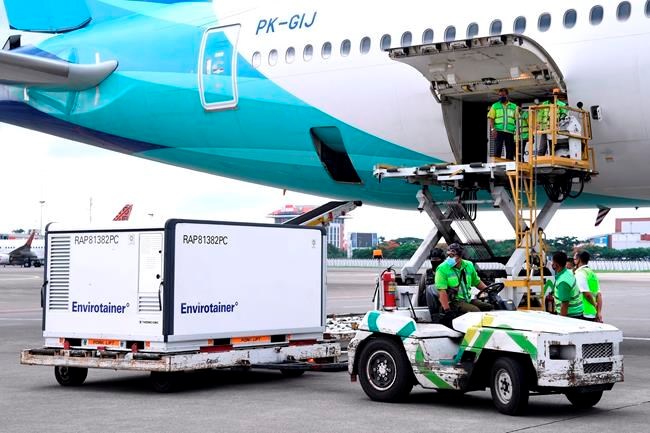JAKARTA, Indonesia — Indonesian President Joko Widodo received the first shot of a Chinese-made coronavirus vaccine Wednesday after the government authorized it for emergency use and began efforts to vaccinate millions of people across the vast archipelago in one of the world’s most populous countries.
Indonesia’s vaccination program is the first large-scale use outside of China of the Sinovac Biotech Ltd. vaccine. It poses massive challenges in a country whose thousands of islands stretch across an area about as wide as the continental United States and where transportation and infrastructure are limited in many places. Health officials have also noted it will be difficult to keep the vaccine at the required 36–46 degrees Fahrenheit (about 2-8 degrees Celsius) to maintain its safety and effectiveness.
After President Widodo, top military, police and medical officials also received shots, as did the secretary of the Indonesian Ulema Council, the clerical body that last week ruled the vaccine was halal, or acceptable for use under Islamic law.
A health care worker, businesspeople and a social media influencer also got the vaccine to encourage others to follow suit once it is available to them. Officials have said they will prioritize health care workers, civil servants and other at-risk populations, and the two-dose vaccine will be free for all Indonesian citizens.
“We need to do the vaccination to stop the chain spread of COVID-19 and give health protection to us and the safety to all Indonesian people. It will also help accelerate economic improvement,” Widodo said.
While the Pfizer-BioNTech vaccine has been greeted with much fanfare in the West, its relatively high price and requirement for ultra-cold storage mean that other shots, like Chinese, Russian and the AstraZeneca vaccines, are more likely to be distributed to much of the developing world, even as experts have said more data needs to be shared about the Chinese and Russian products.
Indonesia plans to vaccinate two-thirds of its population of about 270 million people — or just over 180 million people. That means it needs about 427 million shots, given the estimate that 15% may be wasted, Health Minister Budi Gunadi Sadikin said.
“This vaccine is the instrument we can use to protect us. But more importantly, the vaccine is the instrument to protect our family, our
He noted that given Indonesia's enormous population — the world's fourth largest — its vaccination program is key to worldwide efforts to protect enough people so that the global community reaches herd immunity.
But he cautioned that great obstacles remain.
“We know that the cold-chain distribution is not complete. This is the obstacle,” Sadikin said this week. “We are worried.”
The rollout comes as Indonesia registered the daily record in COVID-19 infections and fatalities on Wednesday, with 11,278 new cases and 306 new deaths reported in the last 24 hours. The country has recorded more than 858,000 infections and over 24,900 deaths.
Some scientists warn that not enough data has been published about the effectiveness or safety of the Sinovac vaccine — and there is uncertainty over just how protective it is. It has yet to be tested in tens of thousands of people in the kind of rigorous study considered necessary before being licensed for wide use.
Researchers in Brazil last week had pegged the vaccine as 78% effective at protecting against symptomatic illness — but this week, after a closer look at mild cases, they announced data showing overall, effectiveness is just over 50%.
“There’s no doubt” about the new calculations, said Dr. Denise Garrett of the Sabin Vaccine Institute, who is watching the Brazilian data. “That means if you vaccinate 100 people, 50 will be protected against the virus and 50 won’t.”
But she called it “meaningful” that those who fall ill despite vaccination should still be less likely to suffer serious symptoms.
Researchers in Turkey and Indonesia had announced the vaccine was more effective, but those studies were far too small to be conclusive, and scientists had been watching Brazil’s study of approximately 12,500 volunteers in hopes of more clarity. Global health authorities have said any vaccine that is at least 50% effective would be useful.
Besides Indonesia, China and Bolivia have granted conditional use authorization for the Sinovac vaccine. Several other countries have purchase agreements for millions of doses, including the Philippines, Singapore and Ukraine.
Chinese health officials have said that some 9 million vaccine doses have been administered in China, though the number of people who received the Sinovac shot itself has not been disclosed. China has several vaccines in development.
Indonesia received its first shipment of the Sinovac vaccines on Dec. 6 and began distributing the doses around the country while awaiting emergency use authorization. It was cleared for that use based on clinical trial data and after the Indonesian Ulema Council declared the vaccine halal.
___
Associated Press writer Mauricio Savarese contributed to this report from Sao Paulo.
___
The Associated Press Health and Science Department receives support from the Howard Hughes Medical Institute’s Department of Science Education. The AP is solely responsible for all content.
Edna Tarigan And Victoria Milko, The Associated Press



